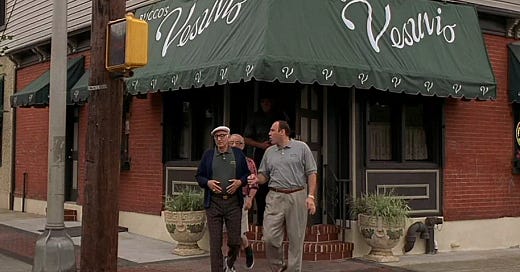👁️ Who is the New York Times Lying For?
The Times' primary FTX reporter has shocking family ties to the story. Also: The Red Lobster Bust-Out.
Welcome to the weekly Dark Markets news roundup. Today’s a bit of an exception, with one story the main focus - new evidence that the New York Times’ coverage of Sam Bankman-Fried is not just skewed, but directly conflicted via family connections of their primary reporter covering the case. We’re going to talk about shrimp first, though.
Don’t forget to check out the latest podcast episode with 0xKitsune talking about community and money, and for premium subscribers, a weekend post with some insights into the book-writing process, and a sneak peek at Chapter 1 of the SBF book.
The Red Lobster Bust-Out
The story of Red Lobster’s bankruptcy last week should be a litmus test for the quality of the business reporting you’re reading. While the low-brow media of the world focused on the idea that customers abusing an “endless shrimp” deal led to the chain’s downfall, smart cookies quickly realized the real cause of the collapse was asset-stripping by the restaurant’s private equity owners.
Specifically, the deathblow was the 2014 sale of Red Lobster’s real estate assets by Golden Gate Capital. The revenue from that sale didn’t go back into Red Lobster, but instead, bizarrely, became revenue the buyout firm used to pay off the debt used to acquire the restaurant. Got it?
Anyway what matters is that after the sale, Red Lobster became a renter of its restaurants, instead of an owner - and as all my renters out there know, that’s a precarious situation.
These asset-stripping sale-leaseback schemes are pretty common among private equity, but I’m hearing them for the first time described with a visceral comparison that captures just how disgusting they are: What Golden Gate did is being regularly compared to a Mafia-style “bust-out,” with Red Lobster in the hapless role of Artie Bucco’s Vesuvio.
Meanwhile, in a signal so pure it’s crystalline, the New York Times’ biggest contribution to the discourse is entirely focused on the all-you-can-eat shrimp. While making noises to the effect that the shrimp deal was “not the biggest” of the chain’s problems, an NPC named Peter Coy nonetheless spends 800 words “speculating” exclusively about how the state of the economy led consumers to abuse the shrimp deal.
In short, it’s yet more evidence that the New York Times’ real job, so instinctive its writers don’t have to ask for directions, is to defend the status quo and those who dominate it - especially when that’s a Bay Area private equity fund. Read on for another, even more disgusting example of how the Paper of Record is really the Paper of Sucking Up to Power.
Who is The New York Times Covering For?
[Correction: This piece previously stated that Gideon Yaffe earned a doctorate in law from Stanford. He earned a PhD in philosophy. It has also been clarifiied that Gideon is David Yaffe-Bellamy’s uncle.]
I am you might say fucking agitated by a recent episode of the New York Times podcast The Daily, which is entitled The Crypto Comeback. I’ll give you one guess what I’m pissed about.
The overall episode is about the broad crypto comeback, including the Bitcoin ETF approval, and it’s anodyne and whatever. Why would you ever trust anything about crypto from the Times after its deep legacy of incompetence.
No, what actually infuriates me is that the lead-in to the story, the “news hook,” as we call it, goes out of its way to yet again cover for Sam Bankman-Fried. Here’s the transcript, because Michael Barbaro’s weird voice is like nails on a chalkboard to me, and I won’t force you to suffer it either.
The episode starts with Times reporter David Yaffe-Bellany delivering the Good News that Sam Bankman-Fried actually paid everyone back! FTX, he says, is “going to able to repay customers, but they'll be able to repay them in full with interest.” This is of course total bullshit, and most victims will get back something like 26% of the current value of the stolen assets.
Then, as if to punch me personally in the balls yet again, Yaffe-Bellany says that “Sam put a lot of this money into investments in other startups, investments in cryptocurrencies, and this was stealing … But some of those investments actually turned out to be really good.”
The strong implication being that Sam’s gambling addiction actually paid off for the people he stole from. That’s absolutely not what happened, holy fucking shit guys!
This instinctively apologetic framing seems to be deployed out of some mix of incompetence, vague class loyalty, and editorial marching orders, with the result if not explicit goal of making SBF look like less of a malevolent villain. It pains me, because I’ve met David Yaffe-Bellany, and he seems … nice enough, I guess?
But a little digging reveals that he might not have been the best pick for the job of covering SBF. Personally, my first red flag is he’s a Yale graduate, so his indoctrination has been too thorough by half already. Yale, remember, is also the home of Ian Ayres, who co-authored a laughably intellectually dishonest defense of Sam Bankman-Fried after his conviction.
But Yaffe-Bellany has far more direct ties, and conflicts, to the FTX story. Gideon Yaffe is David’s uncle, born of one James Yaffe - himself a Yale graduate back in the 1950s. And now Gideon is a law and philosophy professor at Yale, where he, incredibly, studies legal issues of blame and free will extremely close to the topics of interest to Barbara Fried.
And believe it or not - I hardly could - Gideon Yaffe graduated from Stanford with a PhD in philosophy, with a dissertation dated 1998 - when Barbara Fried had been on the Stanford Law faculty for a decade. He has since, even more improbably, written a book about children and criminal responsibility that seems both close to Barbara’s research, and bizarrely relevant to how many people perceived Bankman-Fried’s culpability.
There’s no obvious indication that Yaffe and Fried worked together, and they were in separate departments - but it seems very likely that they would have interacted, given their shared interest.
Does this rise to the level of a direct conflict of interest that should have precluded David Yaffe-Bellany from covering this story for the New York Times? Probably not, and I certainly haven’t found any public information that makes the ties close enough to imply anything definitive or specific.
What I think is more significant here is the general reality of class solidarity that is reflected in the tone and tenor of so much coverage of Bankman-Fried, with the Times only one particularly egregious culprit among many. A guy who is a third-generation Yale graduate doesn’t need a specific reason to feel empathy with Sam Bankman-Fried – he’s already been well-trained enough that he doesn’t have to think about it.






I don't know about the Red Lobster thing. At first, it was a pretty clear clickbait headline. "It's endless shrimp that caused the end!" So clickbaity, I ignored them. But I guess they worked well enough (enough Gen Xers thinking--I remember that! let me click and go back to that simpler time when I wasn't worried about ever affording a house) that people kept talking about it. And now, actually, I'm only seeing "It's not endless shrimp!" stories. First there was this one: https://www.businessinsider.com/red-lobster-endless-shrimp-bankruptcy-private-equity-debt-real-estate-2024-5 . Which did make a big point about the selling of the property, but also said Thai Union Group really killed it. Then recently this one: https://www.cnn.com/2024/05/25/business/red-lobster-bankruptcy-thai-union/index.html . Which skipped past all that selling the equity and went straight into Thai Union Group mismanagement. After reading that, I dunno, it doesn't sound like status quo reporting, and it really does make Thai Union Group seem pretty at fault. (Also, even the crypto news sites couldn't get away from this story: https://protos.com/company-that-killed-red-lobster-put-shrimp-on-the-blockchain/ -- though the way they "chained" this to crypto is pretty tenuous.) As for the NYT article, it sounded insufferable so I didn't bother to see if it was paywalled (probably was).
As for the podcast, though--yeah, that's pretty f'in bad. That's some pure crock-o'-sh*tcoin. That's like hearing a story about someone's grandfather buying a Van Gogh for the equivalent of a dollar back in 1890. Then it gets stolen from the grandfather. But recently it gets recovered. Then it gets sold for $10 million by the ones who recovered it. Then $9,999,990 is paid to the 10,000 lawyers who filled out paperwork regarding the recovery and sale. Then the grandson is given $10 and told to be happy because he got his grandfather's money back with interest.